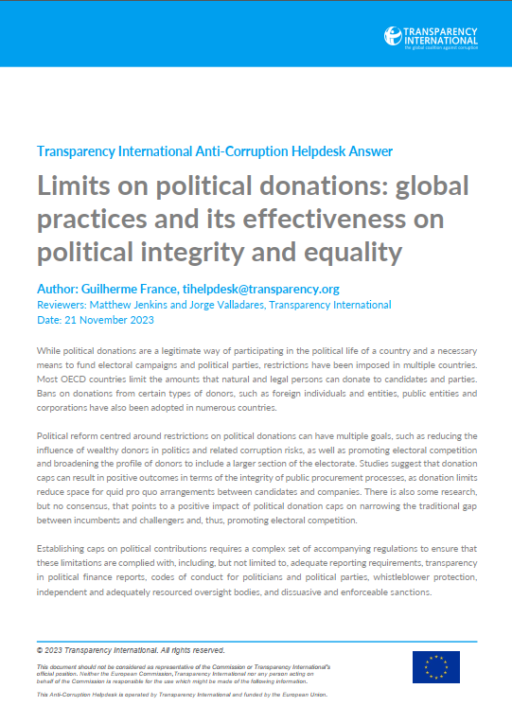- Home
- Anti-Corruption Helpdesk
- Limits on political donations: global practices and its effectiveness on political integrity and equality
Limits on political donations: global practices and its effectiveness on political integrity and equality

This Anti-Corruption Helpdesk brief was produced in response to a query from one of Transparency International’s national chapters. The Anti-Corruption Helpdesk is operated by Transparency International and funded by the European Union.
Query
Please provide an overview of global practices on imposing limits on political donations and present the available evidence on its effectiveness in promoting political integrity and equality.
Summary
While political donations are a legitimate way of participating in the political life of a country and a necessary means to fund electoral campaigns and political parties, restrictions have been imposed in multiple countries. Most OECD countries limit the amounts that natural and legal persons can donate to candidates and parties. Bans on donations from certain types of donors, such as foreign individuals and entities, public entities and corporations have also been adopted in numerous countries.
Political reform centred around restrictions on political donations can have multiple goals, such as reducing the influence of wealthy donors in politics and related corruption risks, as well as promoting electoral competition and broadening the profile of donors to include a larger section of the electorate. Studies suggest that donation caps can result in positive outcomes in terms of the integrity of public procurement processes, as donation limits reduce space for quid pro quo arrangements between candidates and companies. There is also some research, but no consensus, that points to a positive impact of political donation caps on narrowing the traditional gap between incumbents and challengers and, thus, promoting electoral competition.
Establishing caps on political contributions requires a complex set of accompanying regulations to ensure that these limitations are complied with, including, but not limited to, adequate reporting requirements, transparency in political finance reports, codes of conduct for politicians and political parties, whistleblower protection, independent and adequately resourced oversight bodies, and dissuasive and enforceable sanctions.
Main points
Political donations are a legitimate way of participating in the political life of a country and a necessary means of funding electoral campaigns and political parties.
Limitations on donations by natural and legal persons have been adopted in multiple countries with the goal of promoting political integrity and equality.
There is still limited evidence on the effectiveness of donation caps in promoting electoral competition and reducing the risks of quid pro quo related to procurement proceedings.
The effectiveness of political donation caps may be impacted by compliance issues, as a complex enforcement system is needed to ensure candidates and political parties respect these caps.
Contents
- Background
- Overview of caps on political donations in OECD countries
- Evidence on the effect of caps on political donations
- Ensuring compliance with political donation caps
- References
Caveat
Research demonstrating the effectiveness of political donation caps is still limited and there is evidence that points in both directions. Much of the research available centres on the United States’ political system and the policy relevance of this research in other countries may be limited.
Authors
Author: Guilherme France, [email protected]
Reviewers
Matthew Jenkins and Jorge Valladares, Transparency International
Date
21/11/2023
Tags
 Download PDF
Download PDF
